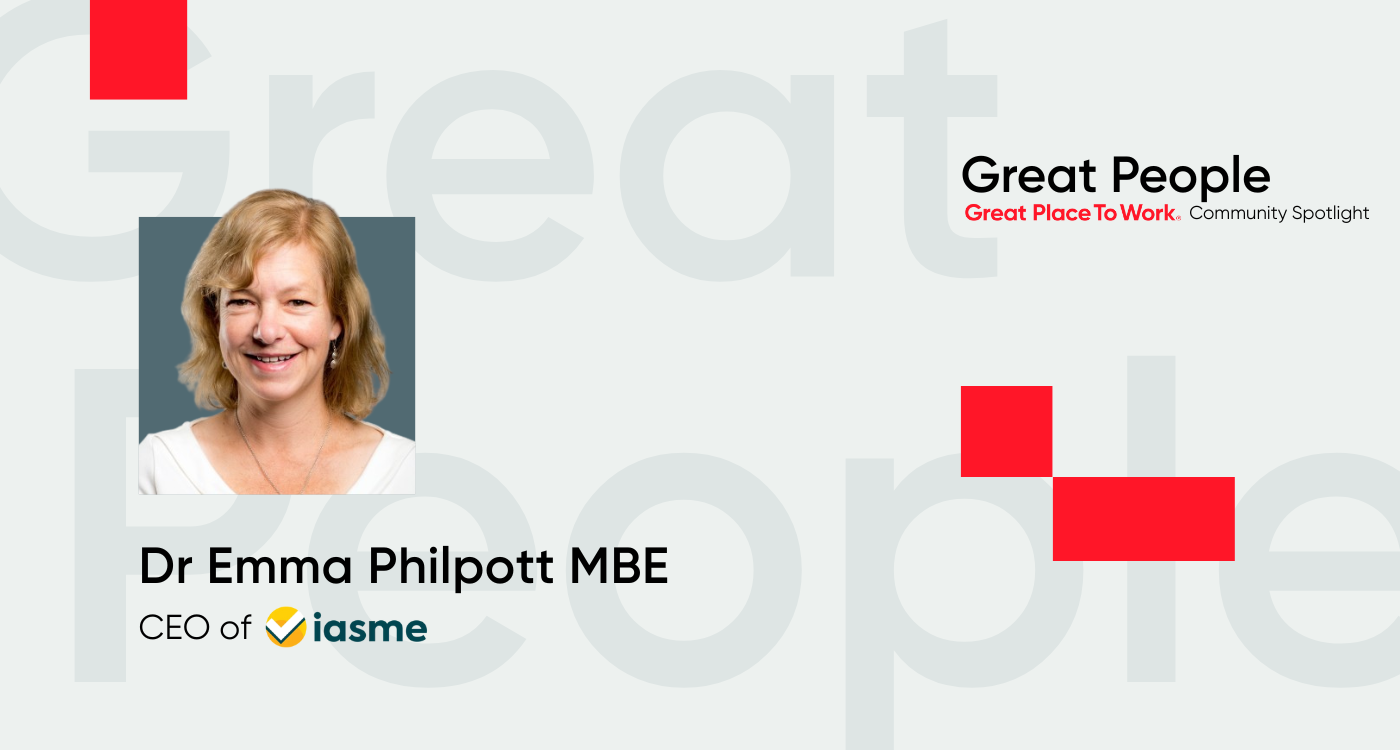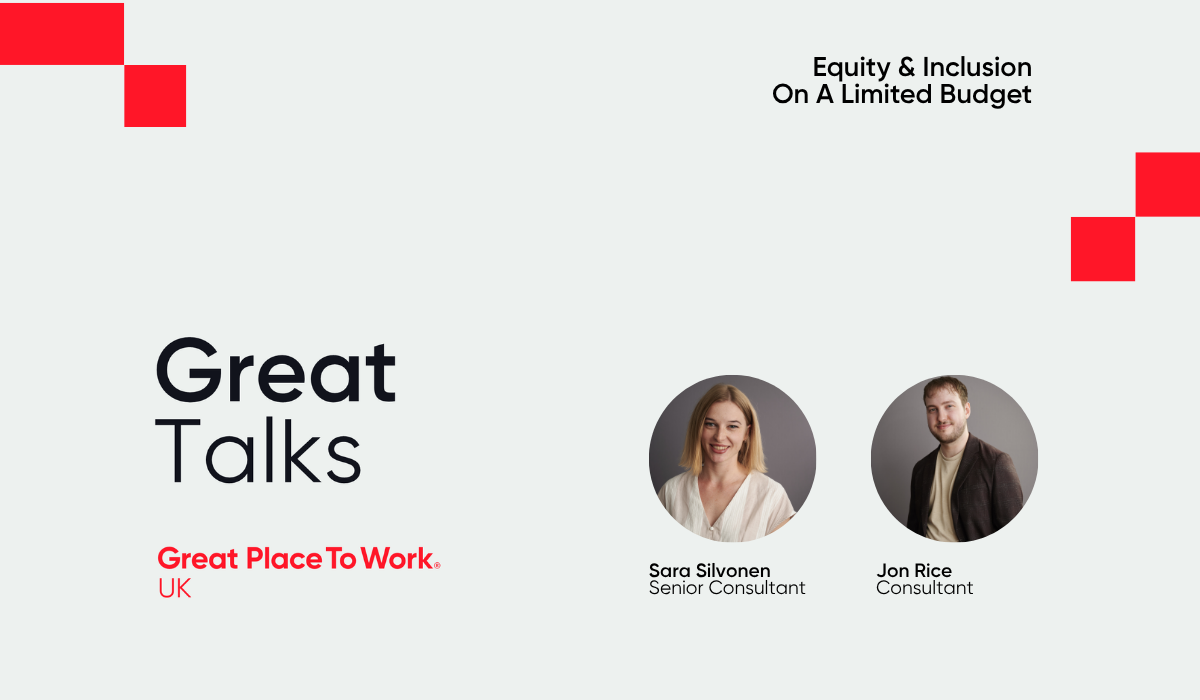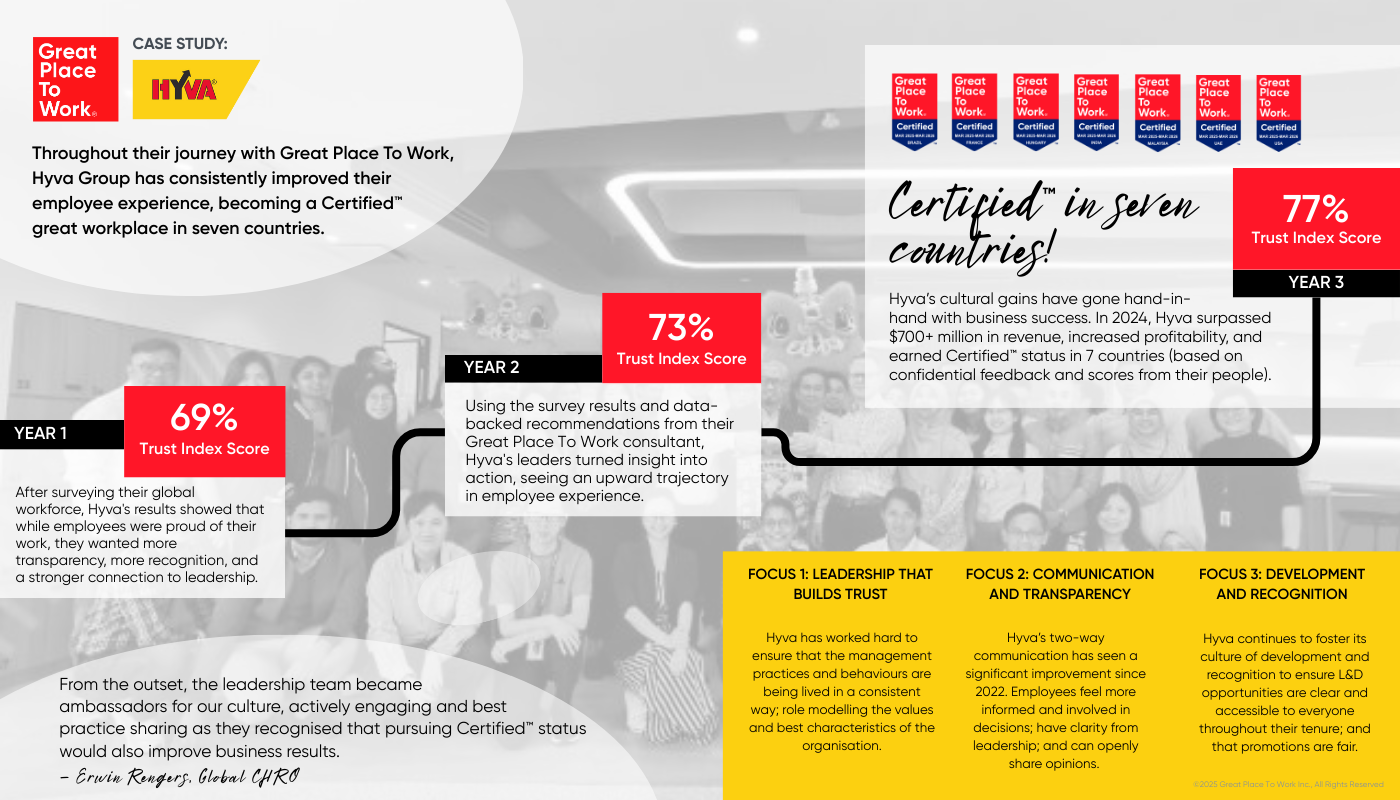We recently met with industry giants from retail and hospitality for some inspiring roundtable conversations.
Key takeaway of the day: great leadership could be the secret sauce to levelling up employee retention and business success across the sector.
On 9th May, Great Place To Work UK, in partnership with UKG, hosted our first-ever Great Culture Collective – an in-person event at the Kimpton Fitzroy hotel in London, run under Chatham House Rules, exclusively for leaders of top-performing organisations within the Retail, Hospitality & Leisure sector.
Our aim: create a safe space where delegates could network, share their experiences, and learn from our collective people-related data and insights around the sector.
Below, we share key takeaways from the inspiring discussions that took place.
“Give everyone a great boss”
As soon as one of our delegates uttered this statement, all heads in the room began nodding in harmony. We all knew what it meant: effective leadership is the key to a great employee experience – and, in turn, better productivity, loyalty, and customer service.
And it’s desperately needed.
Currently, nearly a third (31%) of employees working in retail, hospitality and leisure often think about looking for a job at another organisation.1 This matches the sector’s 31% average turnover reported by the CIPD.2
In terms of impacts on profitability, it’s estimated that employers will need to spend £3,800.00 to replace an employee on an hourly wage of £11.44.
Take a large-sized organisation (such as a hotel or supermarket chain) with 10,000 employees, and the total cost to fill the gaps would be a staggering £11.78 million.
As one delegate shared with us:
“At the end of the day, I’ve always been struck by the saying: we’re an industry of people serving people. This sector needs more of us looking after our people properly. Give them the tools, the flexibility they need to feel great about coming to work every day. Our managers are so crucial to how employees feel about work. It doesn’t matter whether the employee is working in Head Office, if they’re on the floor with customers, in distribution, or whatever…If you start with managers, you can tick off loads of what employees are asking for. This helps us, as the business, but we also then do better by our own people and the people we serve.”
Organisations who actively cultivate their cultures keep their best people
%202023%20UK.png?width=629&height=337&name=Certified%20companies%20graph_vs%20national%20average%20(Retail)%202023%20UK.png)
Source: Great Place To Work® UK 2023 Population Study
Examples of great leadership in retail and hospitality
1. Great leaders provide the right tech and flexibility for their teams.
According to UKG research, 41% of retail employees want more flexibility than what is typically offered in the industry.
In fact:
- 33% say their employer could do better at scheduling
- 35% want easy mobile access to exchange their shifts with colleagues and sign up for available shifts
- 90% feel their work is harder than it should be due to outdated technologies and processes.
Service employees are client-facing, and how they behave with customers can be greatly influenced by how they feel at work. Suffice to say when managers provide their teams with appropriate self-scheduling tools and increased autonomy in how individuals may adjust their working hours, the result is a more effective, efficient, and happier workforce, leading to more positive interactions with their customers.
Of course, this goes hand in hand with improving employees’ digital literacy.
In 2023, the World Economic Forum reported that 60% of employees globally were worried about losing their job to AI in the next 10 years.3
Alongside an upgrade to current tech and processes, employers who upskill digital literacy across the workforce will go further in strengthening the employee experience because this supports employees’ development, psychological wellbeing, and sense of job security.
As a result, employees experience higher levels of wellbeing and, in turn, a stronger intent to stay.

Source: Great Place To Work® UK 2023 Population Study
2. Great leaders ensure true fairness across the organisation.
What may be considered fair treatment for one employee, or a certain team or department, may not be the same as another.
Great leaders take time to get to know their people’s individual needs as well as the needs of their collective team. This may involve tailoring the organisation’s benefits offering and/or work environments for different groups across the business.
For example, what one colleague may need for compassionate leave may differ greatly to another employee’s needs for the same type of leave. Giving managers authority to flex the number of days for individuals’ bereavement could have substantial positive effects on each person’s wellbeing and employee experience.
As one delegate shared at during a roundtable discussion:
“We’ve seen so clearly that different expectations can even come from different generations within the same department. I think it’s so important to say: ‘It’s okay to be different. We can handle different without it causing chaos’. And if we can’t do something that employees want or asked for, to be courageous in telling people that we have looked into it, we can’t afford that right now, or that won’t work unfortunately in our type of business, or for that specific type of role…but we are willing to speak uncomfortable truths as much as sharing what can be done. This is what builds trust and loyalty.”
Managers are fundamental to the employee experience because their daily interactions with employees and teams significantly impact their people’s perceptions of their employer and, sometimes, the wider industry.
“Some of us have been in this [retail] business for over 10 years. We know that retail and hospitality is more than “just a job”,” shared another delegate. “But it’s so hard to prove that to our people unless more of us become genuinely great workplaces for everyone who works with us.”
| Related: How to Manage a Multigenerational Workforce
3. Great leaders treat employees as they would their customers
Ensuring that your employee experience mirrors your customer experience will role-model culture internally, which can then be reflected externally, thus helping employees to deliver the best service to their customers.
One award-winning hotel brand, for example, has recently revamped their back of house to provide employees a similar style and level of comfort in their break rooms and cafeterias as the rooms and leisure areas offered to the hotel’s guests.
This makes their people feel valued, respected, and helps keep employees’ motivated to provide exceptional service throughout the day.
Another example comes from a retailer whose core messaging of is around loving employees as they are, which is mentioned at every key touchpoint along the employee journey, beginning at the onboarding stage. It’s an inclusive company value that instantly allows colleagues to feel welcome and encouraged to bring their whole selves to work. This then fuels feelings of belonging, driving increased engagement, job satisfaction and loyalty.
Hospitality and retail are sectors where human interactions are paramount.
In a people-first culture, great managers can bring out the best in their teams by displaying empathy and focusing on individuals’ preferences and needs. This then allows them to live by the Platinum Rule: treat the employee as they would like to be treated.
And yes, delegates did acknowledge that this may require financial investment – whether it be in upgrading technology available to employees, enhancing benefits packages or physical work environments, or upskilling leaders to become better managers.
But it pales in comparison to the grave cost of losing talented people – to competitors or another industry entirely.
Empowering people to give of their best ultimately benefits the bottom-line: a win-win.
Every employer, regardless of sector, wants to experience reduced turnover, improved customer satisfaction, enhanced productivity and teamwork, and a positive brand image.
These insights from our first Great Culture Collective provide a compelling basis for C-suite Executives to recognise the critical role great culture and leadership plays in shaping employee experience and retention.
"I've written a gazillion pages of notes, which has been fantastic! If this was every month, I'd be here every month." – Great Culture Collective delegate
Discover what it takes to be a successful leader today and the behaviours that can help ensure both your business and your people are thriving.
>>>Watch our webinar: The Leadership Behaviours That Drive Success (20 min)
Sources:
1 Great Place To Work® UK 2023 Population Study
%202023%20UK.png)











